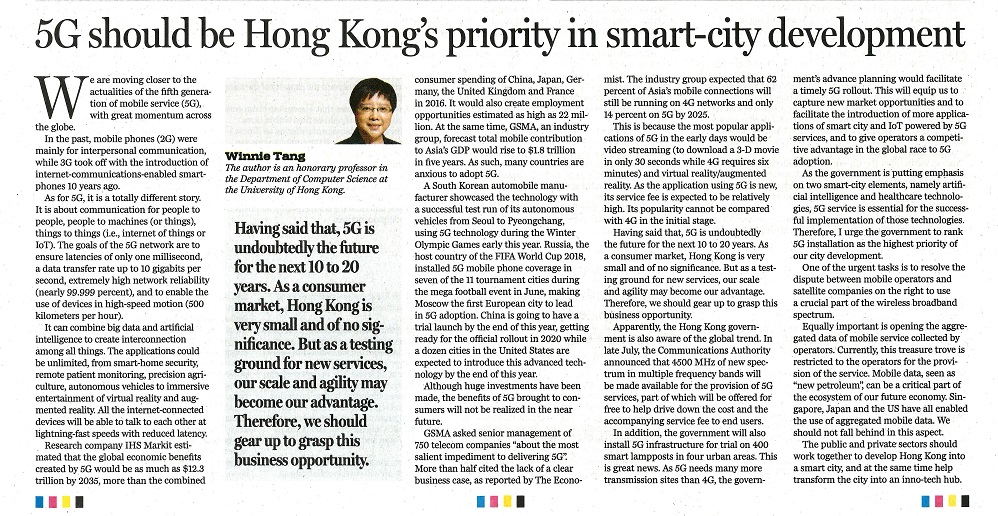網上版請按此

5G should be Hong Kong's priority in smart-city development
We are moving closer to the actualities of the fifth generation of mobile service (5G), with great momentum across the globe.
In the past, mobile phones (2G) were mainly for interpersonal communication, while 3G took off with the introduction of internet-communications-enabled smartphones 10 years ago.
As for 5G, it is a totally different story. It is about communication for people to people, people to machines (or things), things to things (i.e., internet of things or IoT). The goals of the 5G network are to ensure latencies of only one millisecond, a data transfer rate up to 10 gigabits per second, extremely high network reliability (nearly 99.999 percent), and to enable the use of devices in high-speed motion (500 kilometers per hour).
It can combine big data and artificial intelligence to create interconnection among all things. The applications could be unlimited, from smart-home security, remote patient monitoring, precision agriculture, autonomous vehicles to immersive entertainment of virtual reality and augmented reality. All the internet-connected devices will be able to talk to each other at lightning-fast speeds with reduced latency.
Research company IHS Markit estimated that the global economic benefits created by 5G would be as much as $12.3 trillion by 2035, more than the combined consumer spending of China, Japan, Germany, the United Kingdom and France in 2016. It would also create employment opportunities estimated as high as 22 million. At the same time, GSMA, an industry group, forecast total mobile contribution to Asia's GDP would rise to $1.8 trillion in five years. As such, many countries are anxious to adopt 5G.
A South Korean automobile manufacturer showcased the technology with a successful test run of its autonomous vehicles from Seoul to Pyeongchang, using 5G technology during the Winter Olympic Games early this year. Russia, the host country of the FIFA World Cup 2018, installed 5G mobile phone coverage in seven of the 11 tournament cities during the mega football event in June, making Moscow the first European city to lead in 5G adoption. China is going to have a trial launch by the end of this year, getting ready for the official rollout in 2020 while a dozen cities in the United States are expected to introduce this advanced technology by the end of this year.
Although huge investments have been made, the benefits of 5G brought to consumers will not be realized in the near future.
GSMA asked senior management of 750 telecom companies "about the most salient impediment to delivering 5G". More than half cited the lack of a clear business case, as reported by The Economist. The industry group expected that 62 percent of Asia's mobile connections will still be running on 4G networks and only 14 percent on 5G by 2025.
This is because the most popular applications of 5G in the early days would be video streaming (to download a 3-D movie in only 30 seconds while 4G requires six minutes) and virtual reality/augmented reality. As the application using 5G is new, its service fee is expected to be relatively high. Its popularity cannot be compared with 4G in the initial stage.
Having said that, 5G is undoubtedly the future for the next 10 to 20 years. As a consumer market, Hong Kong is very small and of no significance. But as a testing ground for new services, our scale and agility may become our advantage. Therefore, we should gear up to grasp this business opportunity.
Apparently, the Hong Kong government is also aware of the global trend. In late July, the Communications Authority announced that 4500 MHz of new spectrum in multiple frequency bands will be made available for the provision of 5G services, part of which will be offered for free to help drive down the cost and the accompanying service fee to end users.
In addition, the government will also install 5G infrastructure for trial on 400 smart lampposts in four urban areas. This is great news. As 5G needs many more transmission sites than 4G, the government's advance planning would facilitate a timely 5G rollout. This will equip us to capture new market opportunities and to facilitate the introduction of more applications of smart city and IoT powered by 5G services, and to give operators a competitive advantage in the global race to 5G adoption.
As the government is putting emphasis on two smart-city elements, namely artificial intelligence and healthcare technologies, 5G service is essential for the successful implementation of those technologies. Therefore, I urge the government to rank 5G installation as the highest priority of our city development.
One of the urgent tasks is to resolve the dispute between mobile operators and satellite companies on the right to use a crucial part of the wireless broadband spectrum.
Equally important is opening the aggregated data of mobile service collected by operators. Currently, this treasure trove is restricted to the operators for the provision of the service. Mobile data, seen as "new petroleum", can be a critical part of the ecosystem of our future economy. Singapore, Japan and the US have all enabled the use of aggregated mobile data. We should not fall behind in this aspect.
The public and private sectors should work together to develop Hong Kong into a smart city, and at the same time help transform the city into an inno-tech hub.
Having said that, 5G is undoubtedly the future for the next 10 to 20 years. As a consumer market, Hong Kong is very small and of no significance. But as a testing ground for new services, our scale and agility may become our advantage. Therefore, we should gear up to grasp this business opportunity.
Dr. Winnie Tang
Honorary professor, the Department of Computer Science at the University of Hong Kong